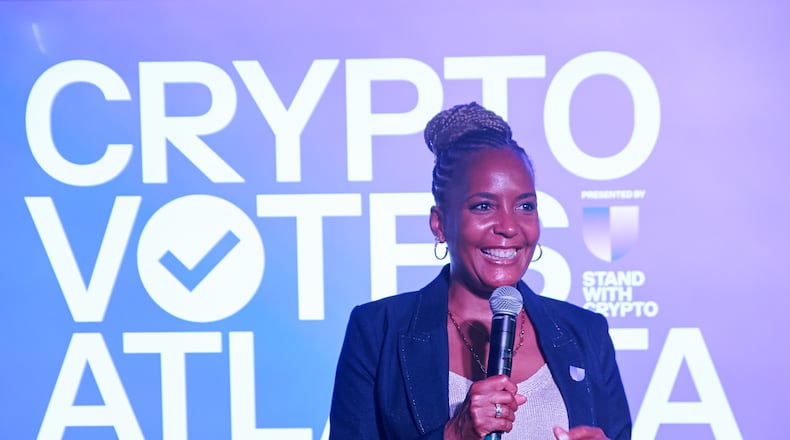According to the nonprofit organization Stand With Crypto Alliance, more than fifty million voters participating in the 2024 election are cryptocurrency owners. The Alliance also believes these voters are potential advocates who want more federal support and regulation of the industry.
Ahead of tonight’s first presidential debate in Atlanta, members of the nonprofit, which aims to mobilize crypto owners, held a rally for their cause. Attendees and participants shared beliefs that cryptocurrency and its future are bipartisan topics which could sway independent voters in the November election, and which they hope will be mentioned in the televised CNN debate.
On Wednesday, dozens gathered inside Northside Tavern to hear speakers discuss the future of cryptocurrency.
Faryar Shirzad, chief policy officer of the publicly traded cryptocurrency exchange Coinbase, attended the event as a supporter.
“[This event is] fundamentally about bringing out the crypto voter or 50 million Americans who own crypto,” Shirzad said, “as they’ve been largely overlooked by politicians who just don’t realize how big a community of Americans have decided to adopt crypto technology in their lives.”
Organizers provided participants with free food and drinks. There were also guest performances from Atlanta hip-hop acts Bow Wow and Dem Franchize Boyz.
Bow Wow’s performance included a live rendition of songs like the rap slow jam “Let Me Hold You,” while Dem Franchize Boyz entertained with their hit dance track “Lean Wit It, Rock Wit It.”
Credit: Courtesy of Stand With Crypto
Credit: Courtesy of Stand With Crypto
Bow Wow, who calls himself a longtime user of cryptocurrency, explained that the issue of crypto and its future is one that hits close to home.
Revealing that he was first introduced to cryptocurrency by Dem Franchize Boyz member Jamal “Pimpin’” Willingham years ago, Bow Wow said he has since grown to appreciate the industry and connections it facilitates between communities.
“For me, [cryptocurrency] is important because it bridges the gap between hip-hop and people in the tech world,” Bow Wow said. “So my main message is we’ve got to keep it alive. We’ve gotta keep it going.”
In addition to the musical performances, speakers of the event included Former Atlanta Mayor Keisha Lance Bottoms, Anthony Mathis of the Atlanta Blockchain Center, Ronald Falls of Fireblocks and Shawn Wilkinson of Storj.
Bottoms, who recently joined the Biden campaign, and recently joined Coinbase’s global advisory council, claimed crypto has economic and societal benefits. She also suggested that skepticism and negative crypto industry news are results of little legislation regarding crypto, and are not reflective of the overall field.
“What’s really interesting about this industry is that this is an industry that’s asking for regulation. We want more regulation, because we want to make sure that when we’re dealing with these financial products, we’re doing so in a fair way,” Bottoms said.
“We’re doing it in a way that’s equitable and accessible for communities, and we want to make sure that the bad actors don’t have a seat at the table because it gives the industry as a whole a bad name.”
Credit: Courtesy of Stand With Crypto
Credit: Courtesy of Stand With Crypto
Bottoms told the audience her first interaction with cryptocurrency was the Lockbit ransomware cyberattack on Fulton County earlier this year. The former mayor said she’s since made efforts to better understand the industry.
“In getting more information, [cryptocurrency] really aligned with a lot of the things that we focus on in the city of Atlanta – creating opportunity for access [and] initiatives regarding the underbanked, and unbanked, in communities of color,” Bottoms said.
Other cryptocurrency advocates present at the event indicated that industry rallies helped them feel represented as voters and taken seriously as an industry.
“Crypto is meant to make you free, financially,” said Travis Sherman. “Not just as far as getting rich, but sending money wherever you want, whenever you want, 24-7, as well as having technology shift from authorities and big tech [companies] to now ourselves as well.”
About the Author
Keep Reading
The Latest
Featured





